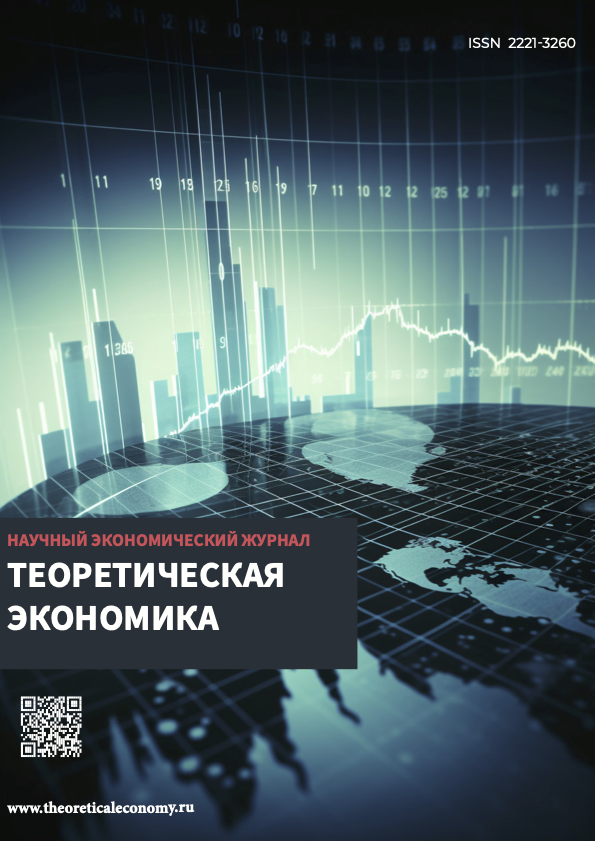Simferopol', Simferopol, Russian Federation
A comprehensive study of a wide body of bibliographic data devoted to information asymmetry over the past 20 years is presented. The basic research directions prevailing in the domestic and foreign literature on the basis of graph clustering methods are systematized. It is shown that at the present time. There is a shift of scientific interests in the study of information asymmetry from the plane of institutional theories in the direction of practical work devoted to the study of the effects which information asymmetry brings to financial markets and product supply chains to the consumer. The interactions realized between seller and buyer in online markets are modelled in terms of the emergence of information asymmetry between them. Based on the theory of agent-based modelling we present a model of virtual consumer choice in online markets, which shows that reducing the level of information asymmetry is possible by increasing buyer awareness through the use of a wide range of information substitutes, which will lead to increased sales of goods at higher prices.
information asymmetry, Internet, consumer choice, uncertainty, virtual choice model, agent-based modelling.
1. Stigler, G. J. The economics of information // The journal of political economy, 1961. — r. 213-225.
2. Akerlof, G. The market for “lemons”: Quality uncertainty and the market mechanism, UK: Macmillan Education, 1995. — pp. 175-188.
3. Teniwut, W., Betaubun, K., Marimin, M., Djatna, T. (2018). Asymmetric Information Mitigation in Supply Chain: A Systematic Literature Review // Journal of Supply Chain Management, 2018. — №7. — pp. 183-194.
4. Hobbs, J. E. Information asymmetry and the role of traceability systems // Agribusiness, 2004. — №20(4). — rr. 397-415.
5. Holleran, E., Maury, E. B Lokman, Z. Private incentives for adopting food safety and quality assurance // Food policy, 1999. — №24 (6). — rr. 669-683.
6. Elder, J., Jain, P. K., Kim, J. Do tracking stocks reduce information asymmetries? an analysis of liquidity and adverse selection // Journal of Financial Research, 2005. — №28(2). — pp. 197-213. doihttps://doi.org/10.1111/j.1475-6803.2005.00121.x
7. Eisenhardt, K. Agency theory: An assessment and review // Academy of management review, 1989. — №14.1. — pp. 57-74.
8. Jin, M., Zhao, S., Kumbhakar, S. C. Information asymmetry and leverage adjustments: A semiparametric varying-coefficient approach // Journal of the Royal Statistical Society. Series A: Statistics in Society, 2020. — №183(2). — pp. 581-605. doihttps://doi.org/10.1111/rssa.12524
9. Turki, H., Wali, S., Boujelbene, Y. IFRS, information asymmetry and growth opportunities // International Journal of Service Science, Management, Engineering, and Technology, 2017. — № 8(2). — pp. 43-60. doihttps://doi.org/10.4018/IJSSMET.2017040105
10. Yildiz, Y. Foreign institutional investors, information asymmetries, and asset valuation in emerging markets // Research in International Business and Finance, 2021. — №56 doihttps://doi.org/10.1016/j.ribaf.2021.101381
11. Gao, W., Zhu, F. Information asymmetry and capital structure around the world // Pacific Basin Finance Journal, 2015. — № 32. — pp. 131-159. doihttps://doi.org/10.1016/j.pacfin.2015.01.005
12. Shen, C. Pecking order, access to public debt market, and information asymmetry // International Review of Economics and Finance, 2014. — №29. — pp. 291-306. doihttps://doi.org/10.1016/j.iref.2013.06.002
13. Lovo, S., Raimbourg, P., & Salvadè, F. Credit rating agencies, information asymmetry and US bond liquidity // Journal of Business Finance and Accounting. — 2022. doihttps://doi.org/10.1111/jbfa.12610
14. Romito, S., Vurro, C. Non-financial disclosure and information asymmetry: A stakeholder view on US listed firms // Corporate Social Responsibility and Environmental Management, 2021. — №28(2). — rr. 595-605. doihttps://doi.org/10.1002/csr.2071
15. Donskova, L. A. Informacionnaya asimmetriya na rossiyskom rynke prodovol'stvennyh tovarov: suschnost', problemy, puti resheniya // Vestnik Orenburgskogo gosudarstvennogo universiteta, 2012. — №1 (137). [Elektronnyy resurs] - Rezhim dostupa k zhurn. cvobodnyy: https://www.elibrary.ru/item.asp?id=17736339
16. Grigor'eva, S. A., Kolmykova, T. V. Vliyanie vybora akciy kak sredstva platezha na effektivnost' sdelok M&A v usloviyah informacionnoy asimmetrii // Vestnik Moskovskogo universiteta. Seriya 6: Ekonomika, 2020. — №3. [Elektronnyy resurs] - Rezhim dostupa k zhurn. cvobodnyy: https://elibrary.ru/item.asp?id=43106043
17. Macievskiy, N. S. Disfunkcii rynochnogo mehanizma v usloviyah informacionnoy asimmetrii // Izvestiya Tomskogo Politehnicheskogo universiteta, 2011. — №319 (6). [Elektronnyy resurs] - Rezhim dostupa k zhurn. cvobodnyy: https://www.elibrary.ru/item.asp?id=17091566
18. Chernyshova, M. V. Teoreticheskie osnovy informacionnoy asimmetrii rynka kollektivnyh investiciy // Vestnik Tambovskogo universiteta. Seriya: Gumanitarnye Nauki, 2014. — №11 (139). [Elektronnyy resurs] - Rezhim dostupa k zhurn. cvobodnyy: https://www.elibrary.ru/item.asp?id=22665638
19. Suharev, O. S. Model' ekonomicheskogo rosta s informacionnoy asimmetriey i neravenstvom // Problemy rynochnoy ekonomiki, 2018. — №2. [Elektronnyy resurs] - Rezhim dostupa k zhurn. cvobodnyy: https://doi.org/10.33051/2500-2325-2018-2-57-68
20. Koroteev, M. V., Belyayceva, K. A. Teoretiko-igrovoe modelirovanie proyavleniy informacionnoy asimmetrii na rynke truda // Izvestiya Volgogradskogo gosudarstvennogo tehnicheskogo universiteta, 2016. — №1 (180). [Elektronnyy resurs] - Rezhim dostupa k zhurn. cvobodnyy: https://www.elibrary.ru/item.asp?id=25597590
21. Merkulova, E. P. Informacionnaya asimmetriya na rynke obrazovatel'nyh uslug i professional'naya konkurentosposobnost' vypusknikov regional'nyh vuzov // Vestnik Irkutskogo gosudarstvennogo tehnicheskogo universiteta, 2013. — №9 (80). [Elektronnyy resurs] - Rezhim dostupa k zhurn. cvobodnyy: https://elibrary.ru/item.asp?id=20306178
22. Ceykovec, N. V. Polozhitel'nye aspekty informacionnoy asimmetrii // Apriori. Ceriya: Gumanitarnye nauki, 2015. — №3. [Elektronnyy resurs] - Rezhim dostupa k zhurn. cvobodnyy: https://www.elibrary.ru/item.asp?id=23555873
23. Kislyakov, A. N. Grafovaya klasterizaciya povedencheskoy aktivnosti pol'zovateley produkta s uchetom informacionnoy asimmetrii // Izvestiya Yugo-Zapadnogo gosudarstvennogo universiteta. Seriya: Ekonomika. Sociologiya. Menedzhment, 2020. — №10 (3). [Elektronnyy resurs] - Rezhim dostupa k zhurn. cvobodnyy: https://elibrary.ru/item.asp?id=43159962
24. Garin, A. V. Klassifikaciya blag cifrovyh platform razlichnyh tipov v usloviyah informacionnoy asimmetrii // Informacionno-ekonomicheskie aspekty standartizacii i tehnicheskogo regulirovaniya, 2019. — №6 (52). [Elektronnyy resurs] - Rezhim dostupa k zhurn. cvobodnyy: https://elibrary.ru/item.asp?id=42432529
25. Garin, A. V., Balvanovich, A. V., Zlydnev, M. I., Niyazova, Yu. M. Snizhenie informacionnoy asimmetrii funkcionirovaniya produktovyh cifrovyh platform za schet integracii adaptirovannoy informacii o standartah kachestva // Informacionno-ekonomicheskie aspekty standartizacii i tehnicheskogo regulirovaniya, 2019. — №6 (52). [Elektronnyy resurs] - Rezhim dostupa k zhurn. cvobodnyy: https://www.elibrary.ru/item.asp?id=42432531
26. Bao L, Fritchman, J. Dual-Space Information Modeling of Socio-Economic Systems under Information Asymmetry // Entropy (Basel), 2019. — №21 (5). — rr. 528. doi:https://doi.org/10.3390/e21050528.
 This work is licensed under Creative Commons Attribution-NonCommercial-NoDerivatives 4.0 International
This work is licensed under Creative Commons Attribution-NonCommercial-NoDerivatives 4.0 International












